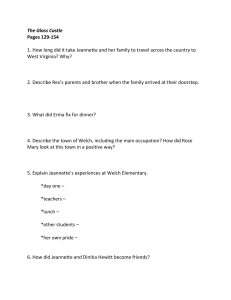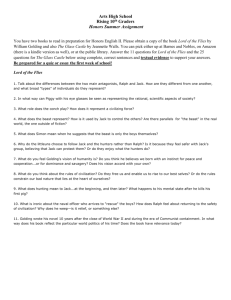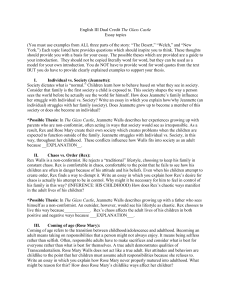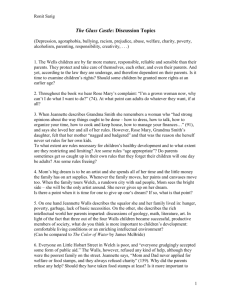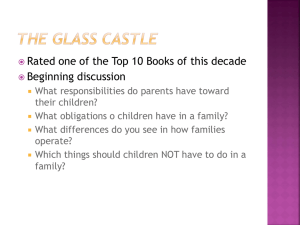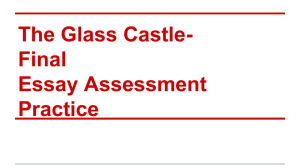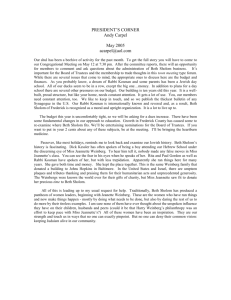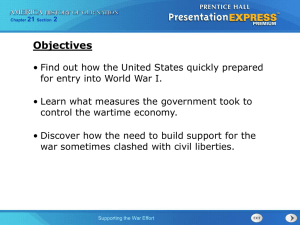Tucker.SummerReading..
advertisement
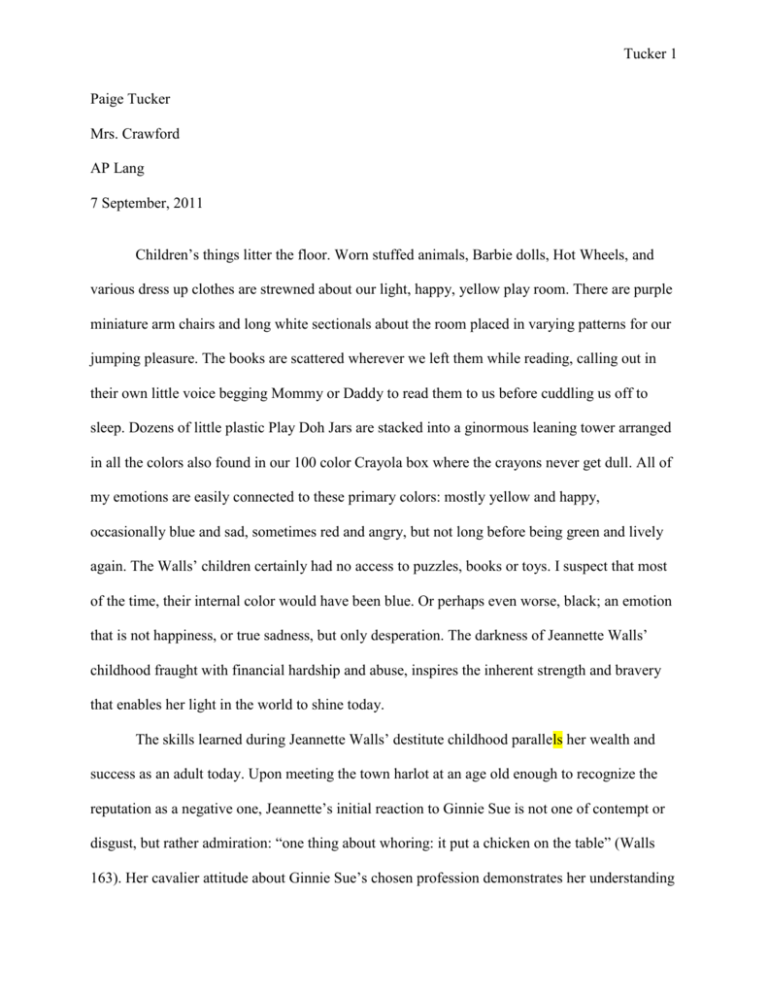
Tucker 1 Paige Tucker Mrs. Crawford AP Lang 7 September, 2011 Children’s things litter the floor. Worn stuffed animals, Barbie dolls, Hot Wheels, and various dress up clothes are strewned about our light, happy, yellow play room. There are purple miniature arm chairs and long white sectionals about the room placed in varying patterns for our jumping pleasure. The books are scattered wherever we left them while reading, calling out in their own little voice begging Mommy or Daddy to read them to us before cuddling us off to sleep. Dozens of little plastic Play Doh Jars are stacked into a ginormous leaning tower arranged in all the colors also found in our 100 color Crayola box where the crayons never get dull. All of my emotions are easily connected to these primary colors: mostly yellow and happy, occasionally blue and sad, sometimes red and angry, but not long before being green and lively again. The Walls’ children certainly had no access to puzzles, books or toys. I suspect that most of the time, their internal color would have been blue. Or perhaps even worse, black; an emotion that is not happiness, or true sadness, but only desperation. The darkness of Jeannette Walls’ childhood fraught with financial hardship and abuse, inspires the inherent strength and bravery that enables her light in the world to shine today. The skills learned during Jeannette Walls’ destitute childhood parallels her wealth and success as an adult today. Upon meeting the town harlot at an age old enough to recognize the reputation as a negative one, Jeannette’s initial reaction to Ginnie Sue is not one of contempt or disgust, but rather admiration: “one thing about whoring: it put a chicken on the table” (Walls 163). Her cavalier attitude about Ginnie Sue’s chosen profession demonstrates her understanding Tucker 2 that it is necessary to do anything to survive. Unlike her parents, who do not practice selfsacrifice for their children, Jeannette does not turn her nose up at opportunities for food and necessity. Of course, this does not suggest that Jeannette is anything mildly resembling a prostitute; however, it does show her desperation and want to succeed. At the end of the novel, the focus on the metaphor of putting food on the table is repeated at the Walls family Thanksgiving dinner. Brian and Jeannette spend a moment looking at the abundance of food being prepared and agree that when the necessities of life like food and family, are put first, it’s easy to attain and enjoy them (Walls 288). News that Rose Mary has been hiding an asset worth over one million dollars does not anger Jeannette, but rather gives her a sad understanding of her mother’s true sickness: “had all those years, as well as Mom and Dad’s time on the street- not to mention their current life in an abandoned tenement- been a caprice inflicted on us by Mom?” (Walls 273). Jeannette does not focus selfishly on her own lost opportunities in life because of her parents’ decisions, but instead worries about the negative lifestyle that Rex and Rose Mary have created for themselves which could have been prevented had they made responsible decisions. Jeannette chooses to let the abuse that plagues her childhood shape her strength and bravery as an adult. At an early age, Jeannette remembers seeing her mother “dangling from the upstairs window of their home, nearly pushed by her father” (Walls 71). Instead of being scarred by this incident, Jeannette is forced from any potential grief, misery, or confusion, and is cast into a permanent role: the comforter. Jeannette is the one holding and caring for her mother and trying to fix her very broken family after these abusive incidents break out. The chapter in which Jeannette is molested in the middle of the night is demonstrative of her family’s dysfunctional dynamic. Rex is absent, out all night on a drinking binge, Rosemary is Tucker 3 peacefully sleeping, completely oblivious to the world, and the children are left to defend the home and protect themselves. Similar to her coping mechanism in Welch, Jeannette’s selfreliance and strength allow her to live in New York City as an adult: “Sometimes I won, sometimes I lost. What worked best was to keep my wits about me” (Walls 248).” If wits were a tangible muscle, Jeannette would certainly be The Situation for all her strength. Jeannette’s acceptance of “winning” and “losing” in various circumstances, and her inherent sense of calm, enables her to endure any obstacle. Brian and Jeannette’s shared sexual abuse creates a bond between them that lasts as adults. Even while living in New York City, Brian “never said anything, but I think he figured that, as when we were kids, we both stood a better chance if we took on the world together” (Walls 250). Rex and Rose Mary’s contributions in their children’s lives are, if anything, negative. Lori, Jeannette, Brian, and Maureen come to rely on solely each other for their survival, seeing that the only way to escape the darkness that is the way of life for their parents, is to help one another change. The darkness that Jeannette and her siblings arose from is embodied in this quote from the preface of the novel, in Dylan Thomas’ Poems on Your Birthday: “Dark is a way and light is a place, heaven that never was nor will be ever is always true.” The contrast in the enlightenment of education, perseverance, and strength with the desperate, destitute, descent into darkness, is repeated at the end of the novel: “the candle flames suddenly shifted, dancing along the border between turbulence and order” (Walls 288). Throughout the novel, the break between turbulence and order, light and dark, is polarized, and it is only Jeannette’s skills and strengths that empower her to choose the light side, overcoming her financial hardship and abuse, to a place in which her light shines brightly. Tucker 4 AN 8-9 PAPER: __x___Is rich in form and content, marked by stylistic finesse. __x___Displays careful organization and development. __x___Has an engaging opening paragraph. __x___Uses skillful and smooth transitions. _x____Has a strong closing paragraph that is thematically related to the opening. __x___Exhibits phrasing that is tight, fresh, and highly specific. __x___Persuasively defends, challenges,or qualifies the argument _x____Presents carefully reasoned argument using appropriate evidence from sources cited or referenced __x___Provides a clear, consistent and authentic voice. _x____Uses accurate and particularly vivid diction. _x____Varies syntax to enhance the essay’s purpose. _x____Has a clear tone that enhances the essay’s purpose. _x____Imparts a feeling of unity and clarity. _x____Makes the author rise above "the pack" by providing a unique point of view and/or topic. _____Contains no (or very few) errors in grammar or mechanics. A 6-7 PAPER: _____Is significantly more than merely competent. _____Delivers substantial information. _____Has a strong opening. _____Contains specific points that are logically ordered and unified. _____Adequately defends, challenges, or qualifies the argument _____Presents a reasoned argument using appropriate evidence in less specific detail than 8/9 papers _____Has an authentic, clear voice. _____Has a closing paragraph that is thematically related to the opening. _____Transitions are mostly smooth. Tucker 5 _____Syntax is pleasingly varied. _____Diction is fairly concise and precise, but not particularly vivid. _____Few errors in grammar/mechanics. A 5 PAPER: _____Is generally competent: meets the minimum terms of the assignment. _____ Reasonably organized. _____Lacks a sense of an authentic voice, often relies on cliches or overused expressions. _____ Defends, challenges, or qualifies the argument. _____Focus may be unclear or argument insufficiently developed. _____A few lapses in diction or syntax may be present, but conveys their writers' ideas more or less clearly. A 4 PAPER: _____Inadequately respond to the task. ____ Misunderstands, misrepresents, or oversimplifies the argument _____A clear organizational structure may not be fully realized. _____Actual information often presented as vague generalities. _____Often lacks specific examples, or may contain specific examples but not clarifying explanations. _____Opening does not draw the reader in, closing is merely a perfunctory wrap-up. _____Demonstrates a beginning awareness of transitions between paragraphs, often choppy or abrupt. _____Little variation in syntax: predictable, repetitive, choppy sentences. _____Diction occasionally marred by repetition, redundancy, and imprecision. _____Relatively free of serious grammatical/mechanical errors. NOTES: This essay soars due to its unique, engaging packaging, exceptionally well-chosen and illuminating textual examples, and insightful analysis! My only suggestion would be to perhaps discuss even more what makes Jeannette break through the darkness and why so many others do not. SCORE: 9/97 Tucker 6
